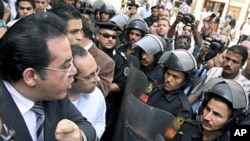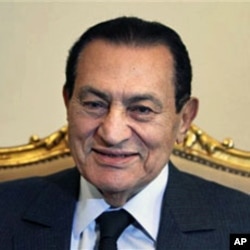As Egypt gears up for its parliamentary elections this month and scheduled presidential elections next year, potential repercussions in the rest of the Arab world remain unclear. In Lebanon, some analysts say Egypt's image in the region could be improved by the upcoming elections.
In a posh shopping center in Beirut, locals laugh when asked about the regional impact of the upcoming Egyptian elections. Corporate lawyer Maher Hoteit says although change in Egypt could positively impact the entire region, he does not think it will happen this time around.
"In my opinion there is no real elections in Egypt. Because the election means you do not know who is going to be elected. But in such a regime, it is already known," said Hoteit.
Parliamentary elections are scheduled for November 28, and the presidential contest is planned for next September. Egypt's ruling National Democratic Party (NDP) is expected to win a majority in parliament, but opposition parties are hoping to gain seats.
The Egyptian government has promised the elections will be free, fair and reflect the changing will of the people, but rights groups have accused the government of stifling the press and arresting opposition candidate supporters.
American University of Beirut Political Science Professor Hilal Khashan says President Hosni Mubarak's administration is more concerned with holding onto power in Egypt than with leading the Arab world. Mr. Mubarak has ruled for nearly 30 years. He might run for a sixth 6-year term in 2011.
"Egypt has withdrawn from the position of a major regional player into one that is mainly concerned about the creation of a political dynasty," said Khashan.
Research director and senior associate Amr Hamzawy, of the Carnegie Middle East Center in Beirut, says Egypt's upcoming elections will not be a step toward democracy because the ruling party decides who can run. But, in an online video, he says the elections could result in a more diversified government and an improvement in Egypt's sinking image in the Arab world.
"The elections, should they result, not in democratic, but in a more pluralist political dynamic, in a more forward-looking, more confident, Egyptian polity are going to impact positively on Egypt's regional role," Hamzawy said.
But outside a coffee shop in Beirut, this man, a human rights professor at St. Joseph's University, says even if the parliamentary elections change the political landscape in Egypt, it will have minimal impact regionally because it is the Mubarak government that calls the shots abroad.
"I do not know if the Egyptian population is ready for democracy. Democracy is a tool and not an objective by itself. So we need to see, 'Is democracy the best solution for the Arab world?" Asked the professor.
After so many years with so little change, he says he doubts current Arab election processes will one day lead to greater freedom and prosperity in Egypt or in the Middle East.
Like other elections in the region, he calls the elections in Egypt "window dressing," set up for the benefit of supporters in the Western world.






